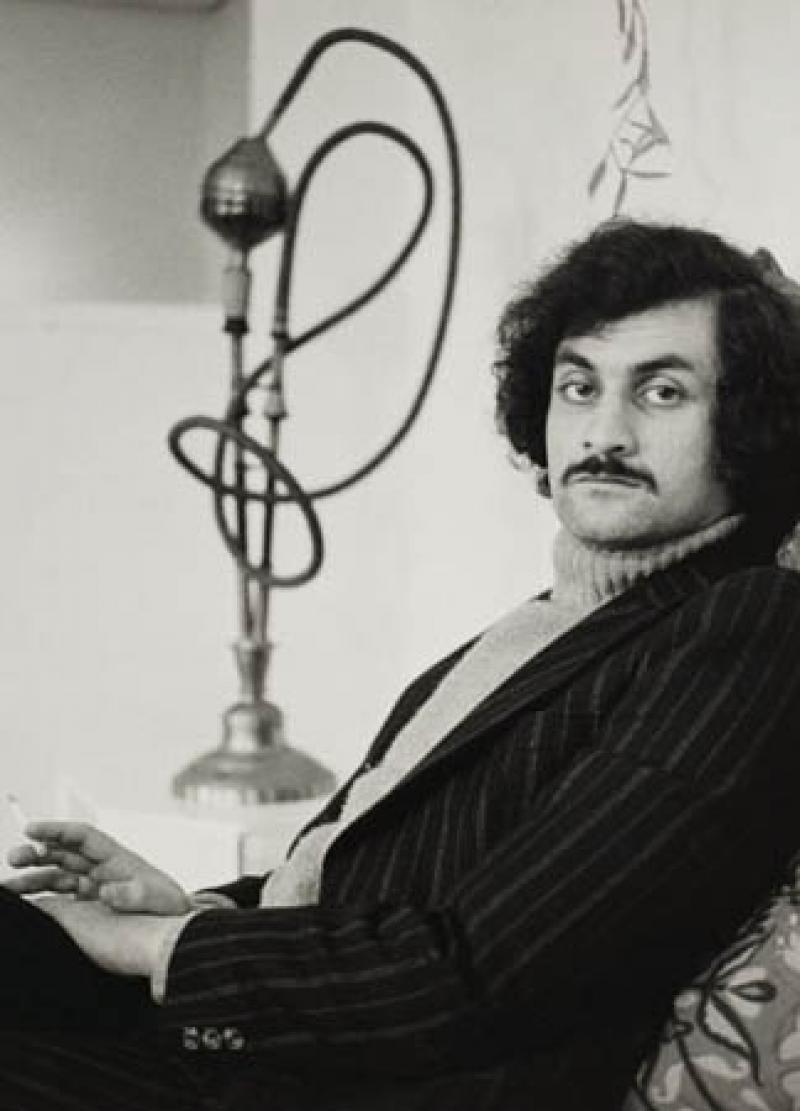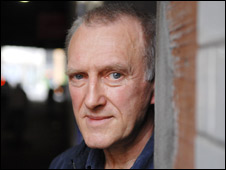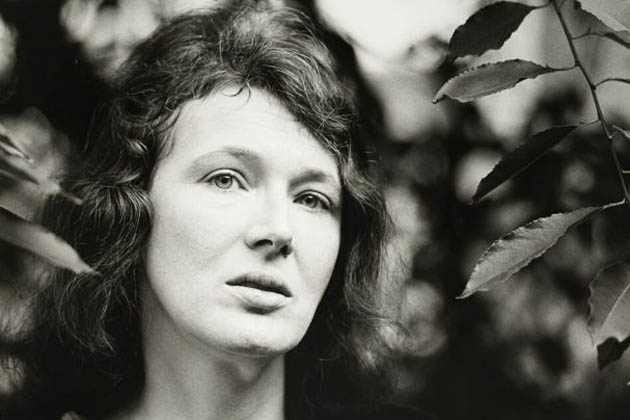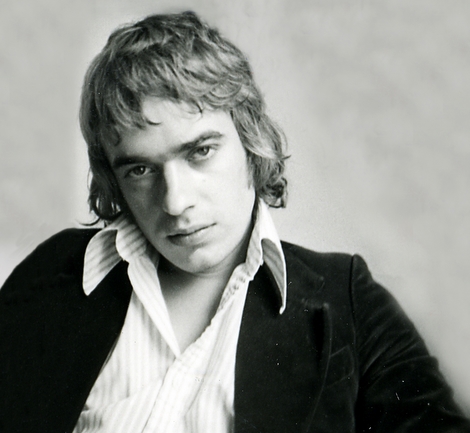In Their Own Words: British Novelists, BBC Four | reviews, news & interviews
In Their Own Words: British Novelists, BBC Four
In Their Own Words: British Novelists, BBC Four
Fascinating archive footage of the authors who wrote the Seventies and Eighties

“The empire writes back” was Salman Rushdie’s pithy summation of the process that changed British literature during the late Seventies and early Eighties, a shift epitomised by his novel Midnight’s Children winning the 1981 Booker prize. It wasn’t just the empire.
Subtitled Nothing Sacred, this was the last programme in an excellent three-part series tracking the British novel through the 20th century using archived interview footage of its most prominent authors. The final installment attempted to capture, in the words of one academic, an age of “irreverence and blasphemy” in which established lines of demarcation became tangled and twisted.
I started out sceptical of this thesis but ended up almost convinced. The hour began unpromisingly, with the usual reductive images trotted out to define the period: race riots, beauty queens, drunken Scottish football fans, the homeless, brick-like mobile phones, IRA blasts, Reagan; in totality, these images apparently signified “a world in flux”. This seemed a narrative convenience – the world is always in flux - but the programme went on to rather deftly – if selectively – bear out Fay Weldon’s claim that writers at that time, much more so than during many other periods in the last century, were “writing out of the society”.
Not just Rushdie, a Mumbai-born middle-class Muslim educated in England, who was grappling with his relationship with history, race and how and why to tell stories; but also the intense Hanif Kureishi, writing about the difficulties of being a “British geezer” trying to shed the baggage of his cultural past and integrate himself into his metropolitan present.
 A different kind of cultural colonialism was challenged in the writings of James Kelman (pictured right), who sought to illustrate – without any imposed "literate" narrator – that the interior life of working-class men and women is as rich, mysterious and valuable as that of more culturally visible members of British society. Coming 15 years after the shitstorm of vicious Anglo-centric snobbery that accompanied Kelman’s 1994 Booker victory with How Late it Was, How Late – too many nasty sweary words, apparently – the fact that the programme couldn't rustle up even one non-Scot to opine about Kelman suggests that writers of his stripe, and the people whose inner landscapes he so assiduously maps, aren’t out of the ghetto just yet.
A different kind of cultural colonialism was challenged in the writings of James Kelman (pictured right), who sought to illustrate – without any imposed "literate" narrator – that the interior life of working-class men and women is as rich, mysterious and valuable as that of more culturally visible members of British society. Coming 15 years after the shitstorm of vicious Anglo-centric snobbery that accompanied Kelman’s 1994 Booker victory with How Late it Was, How Late – too many nasty sweary words, apparently – the fact that the programme couldn't rustle up even one non-Scot to opine about Kelman suggests that writers of his stripe, and the people whose inner landscapes he so assiduously maps, aren’t out of the ghetto just yet.
Over on the other side of the great divide, there was entertaining speculation about the “class anxiety” of writers like Martin Amis and Ian McEwan. In hindsight, it’s rather tempting to view Amis’s state-of-the-Eighties opus Money as the work of a privileged posh boy, cosily aligned to the literary establishment through primogeniture, struggling to get to grips with the collapse of age-old class distinctions – all that new, boorish City cash threatening the old order; his response was one of thrilling, visceral disgust towards a “binge culture” which he was, clearly, more than a little bit in love with.
The cruelty of Amis and McEwan was astutely noted; theirs was often sadistic writing, not just in the acts described in their novels but in the sharp edges of the expression itself. McEwan countered accusations of indulging in “voguish nastiness” by deriding “gratuitous optimism” and describing the elation of writing about violence or terrible acts. The Eighties suited them much more than perhaps either would like to admit.
 The knockabout, common-room carnality of Amis’s debut, The Rachel Papers, was countered by the impact of feminism filtering into fiction; Weldon told how she was inspired by anti-Miss World protests at the Royal Albert Hall. Watching "ordinary women" picketing against “their pretty sisters”, she began questioning the “natural” role of the mother and wife: “What is this nature?” she wrote. Angela Carter (pictured above) – described as “the most imaginative of the post-war writers” – plumbed the undomesticated sexuality of the female psyche, accessed through the dark corridor of fairy tale and myth. Of course, an evil stepmother loomed over the entire programme: Margaret Drabble talked about capturing the “dirty realism” of Thatcher’s Britain, instructing: “Just look down under your feet.”
The knockabout, common-room carnality of Amis’s debut, The Rachel Papers, was countered by the impact of feminism filtering into fiction; Weldon told how she was inspired by anti-Miss World protests at the Royal Albert Hall. Watching "ordinary women" picketing against “their pretty sisters”, she began questioning the “natural” role of the mother and wife: “What is this nature?” she wrote. Angela Carter (pictured above) – described as “the most imaginative of the post-war writers” – plumbed the undomesticated sexuality of the female psyche, accessed through the dark corridor of fairy tale and myth. Of course, an evil stepmother loomed over the entire programme: Margaret Drabble talked about capturing the “dirty realism” of Thatcher’s Britain, instructing: “Just look down under your feet.”
There was much to enjoy; the old footage and archive interviews - linked by Rebecca Front’s narration and interventions by a small cast of talking heads – were especially good value. John Berger, winner of the 1972 Booker with G., railed against the event's sponsor Booker-McConnell’s trading links with the Caribbean. Describing himself in plummy tones as a “revolutionary writer”, he declared his intention to share his £5,000 prize money with the Black Panther Party. My, times have changed.
 McEwan, 1979 vintage, was a vision in fluffy white knitwear, slumped in a wonderfully tatty armchair in his south London flat and displaying a chilly confidence. We were beamed back to 1974, and a nervy Amis (pictured right) seemingly in temporary possession of Noddy Holder’s haircut, chatting to Melvyn Bragg about The Rachel Papers. Footage from a decade later revealed he had evolved fully into the drawling literary sophisticate, taking a good-humoured grilling from Germaine Greer.
McEwan, 1979 vintage, was a vision in fluffy white knitwear, slumped in a wonderfully tatty armchair in his south London flat and displaying a chilly confidence. We were beamed back to 1974, and a nervy Amis (pictured right) seemingly in temporary possession of Noddy Holder’s haircut, chatting to Melvyn Bragg about The Rachel Papers. Footage from a decade later revealed he had evolved fully into the drawling literary sophisticate, taking a good-humoured grilling from Germaine Greer.
Many of these thrusting tyros went on to become today’s establishment heavyweights, and we were reminded that partially it was television that sealed the deal. Not only was Malcolm Bradbury fronting The Book Programme, but the Booker prize was first televised in the Seventies. Literary novelists became significantly more high profile, swaddled within a seemingly permanent fug of fag smoke in shiny frocks, brown suits and velvet jackets, proffering wise and witty observations from behind reassuringly bad teeth. Fame flickered in front of them like the dagger in Macbeth.
Some, of course, became not so much famous as notorious. Nothing Sacred ended with the publication and aftermath of Rushdie’s The Satanic Verses, which showed that there were limits – and dangers - to all this envelope-pushing and taboo-busting. It also backed up the programme’s central premise that seismic rumbles in literature and societal shifts were inextricably linked. Rushdie’s plight – much more so than the contents of his novel, which even today has probably been read by only a tiny fraction of those who became aware of it through the fatwa - shone a global light on the issue of Islamic fundamentalism, which has been a fixture on both the news agenda and literary landscape ever since. A case of empire writes back, author gets bitten.
The future of Arts Journalism
You can stop theartsdesk.com closing!
We urgently need financing to survive. Our fundraising drive has thus far raised £49,000 but we need to reach £100,000 or we will be forced to close. Please contribute here: https://gofund.me/c3f6033d
And if you can forward this information to anyone who might assist, we’d be grateful.

Subscribe to theartsdesk.com
Thank you for continuing to read our work on theartsdesk.com. For unlimited access to every article in its entirety, including our archive of more than 15,000 pieces, we're asking for £5 per month or £40 per year. We feel it's a very good deal, and hope you do too.
To take a subscription now simply click here.
And if you're looking for that extra gift for a friend or family member, why not treat them to a theartsdesk.com gift subscription?
more TV
 theartsdesk Q&A: director Stefano Sollima on the relevance of true crime story 'The Monster of Florence'
The director of hit TV series 'Gomorrah' examines another dark dimension of Italian culture
theartsdesk Q&A: director Stefano Sollima on the relevance of true crime story 'The Monster of Florence'
The director of hit TV series 'Gomorrah' examines another dark dimension of Italian culture
 The Monster of Florence, Netflix review - dramatisation of notorious Italian serial killer mystery
Director Stefano Sollima's four-parter makes gruelling viewing
The Monster of Florence, Netflix review - dramatisation of notorious Italian serial killer mystery
Director Stefano Sollima's four-parter makes gruelling viewing
 The Diplomat, Season 3, Netflix review - Ambassador Kate Wyler becomes America's Second Lady
Soapy transatlantic political drama keeps the Special Relationship alive
The Diplomat, Season 3, Netflix review - Ambassador Kate Wyler becomes America's Second Lady
Soapy transatlantic political drama keeps the Special Relationship alive
 The Perfect Neighbor, Netflix review - Florida found-footage documentary is a harrowing watch
Sundance winner chronicles a death that should have been prevented
The Perfect Neighbor, Netflix review - Florida found-footage documentary is a harrowing watch
Sundance winner chronicles a death that should have been prevented
 Murder Before Evensong, Acorn TV review - death comes to the picturesque village of Champton
The Rev Richard Coles's sleuthing cleric hits the screen
Murder Before Evensong, Acorn TV review - death comes to the picturesque village of Champton
The Rev Richard Coles's sleuthing cleric hits the screen
 Black Rabbit, Netflix review - grime and punishment in New York City
Jude Law and Jason Bateman tread the thin line between love and hate
Black Rabbit, Netflix review - grime and punishment in New York City
Jude Law and Jason Bateman tread the thin line between love and hate
 The Hack, ITV review - plodding anatomy of twin UK scandals
Jack Thorne's skill can't disguise the bagginess of his double-headed material
The Hack, ITV review - plodding anatomy of twin UK scandals
Jack Thorne's skill can't disguise the bagginess of his double-headed material
 Slow Horses, Series 5, Apple TV+ review - terror, trauma and impeccable comic timing
Jackson Lamb's band of MI5 misfits continues to fascinate and amuse
Slow Horses, Series 5, Apple TV+ review - terror, trauma and impeccable comic timing
Jackson Lamb's band of MI5 misfits continues to fascinate and amuse
 Coldwater, ITV1 review - horror and black comedy in the Highlands
Superb cast lights up David Ireland's cunning thriller
Coldwater, ITV1 review - horror and black comedy in the Highlands
Superb cast lights up David Ireland's cunning thriller
 Blu-ray: The Sweeney - Series One
Influential and entertaining 1970s police drama, handsomely restored
Blu-ray: The Sweeney - Series One
Influential and entertaining 1970s police drama, handsomely restored
 I Fought the Law, ITVX review - how an 800-year-old law was challenged and changed
Sheridan Smith's raw performance dominates ITV's new docudrama about injustice
I Fought the Law, ITVX review - how an 800-year-old law was challenged and changed
Sheridan Smith's raw performance dominates ITV's new docudrama about injustice
 The Paper, Sky Max review - a spinoff of the US Office worth waiting 20 years for
Perfectly judged recycling of the original's key elements, with a star turn at its heart
The Paper, Sky Max review - a spinoff of the US Office worth waiting 20 years for
Perfectly judged recycling of the original's key elements, with a star turn at its heart

Add comment